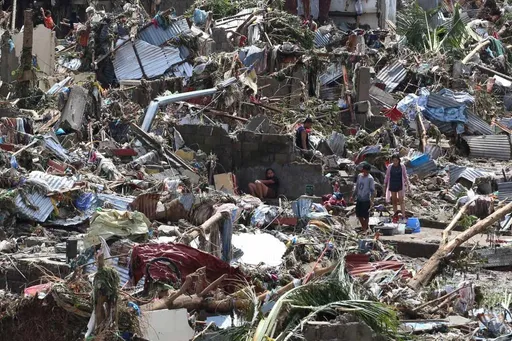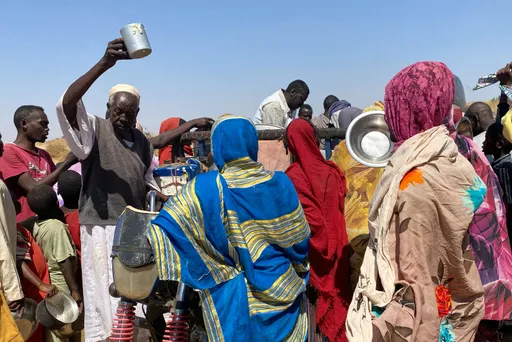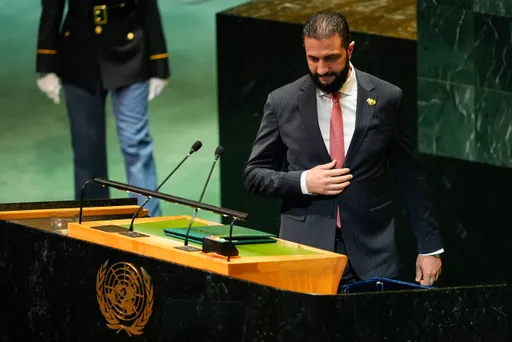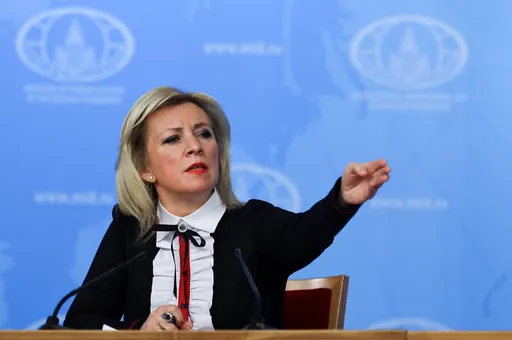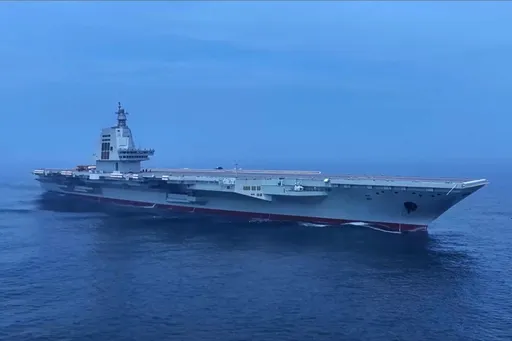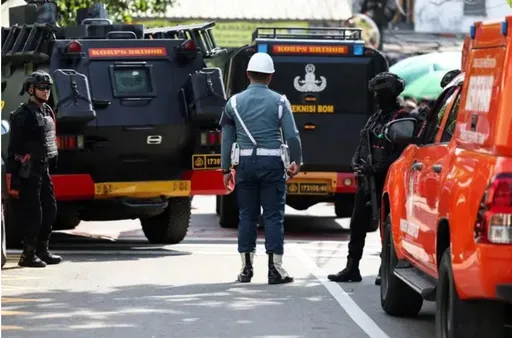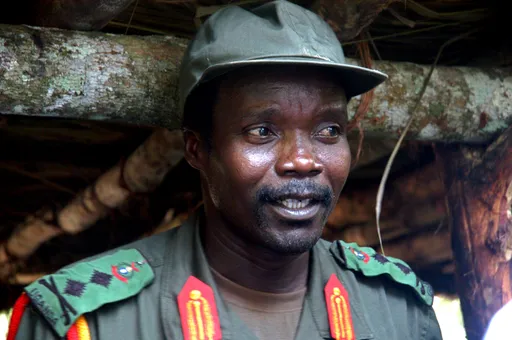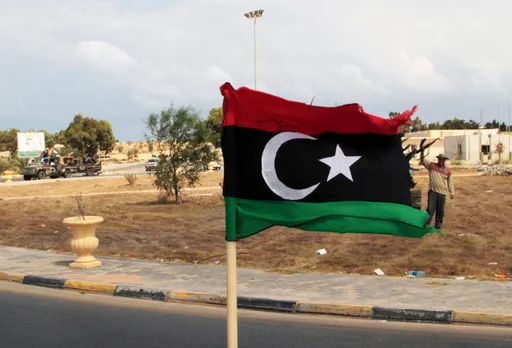"Hummus head-bangers" and "marhaba mashers." Those are some of the fans who American musician Adam Elara is hoping to woo with his upcoming album, brown man down.
Elara, who is based in California, recently spoke to TRT World's Sumayya Tobah about his decision to incorporate Arab and Palestinian influences into his pop punk music, the response he's gotten from the public and the need to stay focused on bringing an end to the violence in Gaza.
TRT World: Your music reminded me of Blink 182, Good Charlotte, Green Day. It was unlike a lot of anti-war music which involves strumming the guitar and being very peaceful. Can you talk to me a little bit about your sound and how you produced it?
Adam Elara: My first instrument was a guitar, and I've always been drawn to all those bands you mentioned. Stuff that I loved got me into making music. As far as the sound goes, I was just doing that style for a while, and then I started incorporating elements of my culture, my heritage into it last year. Because I was just like, I don't sound any different than any suburban white boy with the type of music I'm making and I'm out here thinking, I can make it on merit.
When you're in Texas and growing up in a really hostile environment to Arabs, Muslims and South Asians in general, you just get that kind of, 'they want to squash that pride out of you.' Because I've been playing punk shows, metal shows, etc ever since I started playing music, being the only one of us in those spaces it's kind of like, you gotta conform a little bit, which is funny, because it's an anti-conformist genre, so I don't know.
I think starting two years ago, and last year, I started incorporating more of (my identity) into the music I'm making.
TRT World: Can we go back to the beginning a little bit? What is your background, and where did you grow up? And, because you mentioned Texas, but I know you're in Los Angeles, California now, if you could tell me a little bit about yourself.
Adam Elara: My family has moved around a lot, and our ancestors apparently did too, because I have Arab, Desi and Afghani heritage. I was born in the United States, but shortly after that, I was in school in Saudi Arabia.
I went to school in Pakistan, lived in Uzbekistan, and then the United Arab Emirates, and now I'm back in the States. And I've been in the States for some time now. And within the states in Texas, Illinois and now California. I think I'm home now.
TRT World: So you said you've been playing punk shows and metal for a while, and you recently started incorporating more Arabic or more cultural influences in your music. What brought that change on?
Adam Elara: I was actually thinking about, like, never making music again, during the pandemic. I was just like, 'oh, I don't want to do this anymore. I'll just be an actor.'
And now I can sing a little bit in Arabic, maybe throw in some lines in Urdu, get a tabla and a duff. No one's really been doing this in our scene.
And then I started missing it, and I started doing a lot of introspection. And I realised the very first song that I have memories of was when I was really young in Saudi, so I was maybe, five, six years old. And now it's almost like therapy, you bring memories up, and then I remember prior to 2017, music was kind of illegal in Saudi, so we'd have just the same cassettes and CDs on rotation because there's only so many you could bring back from the US.
Cheb Khalid was on repeat my whole childhood. And then I was just like, man, this is such a bop, this could be in Western music, and I know Timbaland was doing that kind of stuff, and like hip hop, and then another memory showed up where there's a game on Playstation called Prince of Persia. I went back and listened to some of that soundtrack. This dude was mixing Arabic and Persian music in metal 20 years ago.
So I just started going through the DNA of all that kind of stuff. And now I can sing a little bit in Arabic, maybe throw in some lines in Urdu, get a tabla and a duff. No one's really been doing this in our scene.
TRT World: I don't feel like I've heard a sound that's quite like yours. And we've seen an emergence of a lot of artists who are doing bilingual, trilingual stuff. Watermelon Kickflip, the song that dropped this month, has a big emphasis on what's happening now, in a post-October 7 kind of context. Could you walk me through the process of writing that song, producing that song?
Adam Elara: Arabic music, especially Palestinian dabke has very specific rhythms and so does Western pop punk. Our traditional rock has like a four, four beat. And the dabke is married to the dance - it's a line dance, right? You have a very specific kind of thing.
So trying to get those two things to play together nicely was kind of like a math problem, but I knew I wanted it in my head and this whole thing about Philistine. I remember, I'm in the middle of releasing my album. I felt really stupid making music about anything else. Like, anytime I'd be in the studio, I'd just be thinking about it, like you could be on your phone just scrolling, and you just see this absolute destruction, Carnage.
We've always been aware of this stuff, but I don't think it's been this broadcasted. The very first political protest I ever went to was in 2014 in Houston for Palestine. And there were only like 15 of us who were standing in front of the gallery at the time. And now you see, it's like thousands and thousands of people.
So I knew that I wanted it to be equal parts dabke and equal parts pop punk. So I had my friend Hussein. He's Lebanese and a first-time songwriter. We've met acting. And I would convey to him, "man, I want some of these things to be done in a Shami (Syrian/Levantine) dialect when we're speaking, singing in Arabic." And so I asked, "how do you say this, this, this and that." And then we'd restructure it to fit, like, poetically.
We'd be calling parents. Like, I call my dad. I call his father, because our Arabic is stuck at such an elementary school level, and ask, "how do you say this?"
But there was no blueprint for how dabke instruments fit over rock music. So I was figuring out a lot of stuff along the way. I just knew I wanted to get all of this off of my chest, because I felt like, I don't want to sing about a breakup, right?
And it seems so like, what are we doing? And I'm not going to sing about cars and jewellery and stuff. It feels so - you know what it is. The process was mostly just trying to figure out, like, half dabke, half pop punk, Arabic, English, getting them to mix together and not to be too much of a downer, but also not shy away from the seriousness of it.

Children attend a class given by Palestinian teacher Israa Abu Mustafa (not pictured), whose educational centre was destroyed, at a tent amidst the rubble of collapsed buildings in Khan Yunis in southern Gaza on September 4, 2024 (AFP).
Because I wanted to celebrate the strength, the resilience and all that kind of stuff, daiman fi albi and always in our hearts and all that kind of stuff. So that's kind of what we were thinking about the whole time we're writing.
TRT World: Is this (focus on Palestine) something we can expect from the whole album?
Adam Elara: So there are 10 songs from the album that are already out. So the album's called brown man down. So I've just been releasing it song by song. And I think each song has something in there, and this has been the most realised version of that.
I think some of the ones we're working on right now are more like metal, with the Arabic stuff. So I don't know if you know this, I'm sure a lot of people do. But metal really works with Arabic music. Like, it's made for it. It's kind of weird.
It's got that sad, kind of mysterious, minor key stuff. I mean, it just works, yeah? We are definitely doing more of this stuff. We can get some more Arabic, some more Urdu stuff in here, and hopefully play shows with people who are (similar-minded).
I know they're out there. It's just so hard to find the algorithm on this sort of stuff, because it's a niche within a niche. You know, rock music is not the most popular music, and finding the Arab metalheads and the hummus head bangers and the marhaba mashers - it's not easy.
I mean, it found me and it found my high school friends. So I think it's taking its way there. And I said, I sent it to our web editor here. And she was like, "this is my music." I think it's slowly finding its way.
TRT World: I'm wondering if you got any pushback from the themes in your song, from Watermelon Kickflip.
Adam Elara: I had one and it was actually so messed up. Somebody was just like, "we should just go back home after hearing this." And I was like, "Oh, you mean, the right of return?" And she's like, "No, we should be forced out of this country for making this." Oh man, it was too funny.
I've had (Zionist) push back for a while now, and I think that's why I made this song, was that there's a lot of great journalists, people who are very good at educating, making all the infographics and all that, and I felt like I was kind of screaming in a void by just sharing stuff.
There's a lot of great journalists, people who are very good at educating, making all the infographics and all that, and I felt like I was kind of screaming in a void by just sharing stuff. So I thought, I'm gonna make something that's a little undeniable.
So I thought, I'm gonna make something that's a little undeniable. And we're working on a video. I've reached out and gotten approval from the Gaza Skate Team to start putting together some of their clips and help them raise money.
TRT World: Is there anything specific that you want to put out there, or any message you wanted to convey?
Adam Elara: I would just want to remind people why we're doing this. You know, amid this ongoing genocide, donate what we can and keep showing up to the protests. I think the zios would want us to burn out and divert our attention.
There's a lot of leftist fighting right now that I think we shouldn't pay attention to. I think that's like an engineered thing, and just keep focused on the kids. I got my first guitar, like, in middle school. And I'm just thinking when you see all these carnage, all those kids that had their own hopes and dreams that are never gonna happen.
I mean, not to go on a tangent here, but some of us have gotten desensitised to the violence and numbers. And for a while I was like that. The thing that absolutely broke me was a random thing. It was like this 10-year-old-boy, I think he was in Europe.
He was giving a speech on a megaphone about how he used to write letters to his friend in Gaza, and they were pen pals, and then he stopped hearing from him. I was just not the same person after that. It wasn't the bombs, it wasn't any of that stuff.
It was just like this human thing that really puts into perspective, that each single digit is somebody's everything. And so I think if we just keep focusing on that, and no matter how we're making art, protesting and all that, just keeping that centred. I just hope that we can make a difference. That's all.
TRT World: Thank you for putting it out there. I know it's probably kind of scary.
Adam Elara: I'm an unknown artist, right? So I was just like, "well, if no one's listening to it, I might as well say what I actually think." And if people react badly to it, at least they're hearing this thing. And, yeah, if we could piss off as many zios in the punk and metal scene, I think that means that we're doing a good job.
There's nothing more punk than being anti-Zio, in my opinion.












